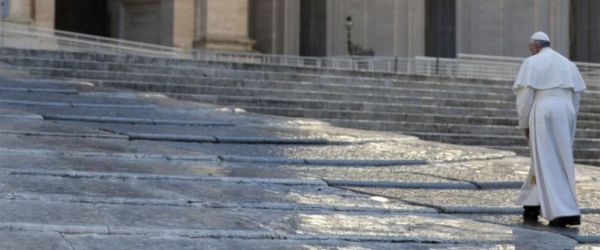The words and gestures of the Lord touch our hearts: He takes the bread in his hands, pronounces the blessing, breaks it and offers it to the disciples, saying: “Take; this is my body” […]
And thus, with simplicity, Jesus gives us the greatest sacrament. His is a humble gesture of giving, a gesture of sharing. At the culmination of his life, he does not distribute an abundance of bread to feed the multitudes, but breaks himself apart at the Passover supper with the disciples. In this way Jesus shows us that the aim of life lies in self-giving, that the greatest thing is to serve. And today once more we find the greatness of God in a piece of Bread, in a fragility that overflows with love, that overflows with sharing. Fragility is precisely the word I would like to underscore. Jesus becomes fragile like the bread that is broken and crumbled. But his strength lies precisely therein, in his fragility. In the Eucharist fragility is strength: the strength of the love that becomes small so it can be welcomed and not feared; the strength of the love that is broken and shared so as to nourish and give life; the strength of the love that is split apart so as to join all of us in unity.
And there is another strength that stands out in the fragility of the Eucharist: the strength to love those who make mistakes. It is on the night he is betrayed that Jesus gives us the Bread of Life. He gives us the greatest gift while he feels the deepest abyss in his heart: the disciple who eats with Him, who dips the morsel in the same plate, is betraying Him. And betrayal is the worst suffering for one who loves. And what does Jesus do? He reacts to the evil with a greater good. He responds to Judas’ ‘no’ with the ‘yes’ of mercy. He does not punish the sinner, but rather gives His life for him; He pays for him. When we receive the Eucharist, Jesus does the same with us: he knows us; he knows we are sinners; and he knows we make many mistakes, but he does not give up on joining his life to ours. He knows that we need it, because the Eucharist is not the reward of saints, no, it is the Bread of sinners. This is why he exhorts us: “Do not be afraid! Take and eat”.
Each time we receive the Bread of Life, Jesus comes to give new meaning to our fragilities. He reminds us that in his eyes we are more precious than we think. He tells us he is pleased if we share our fragilities with him. He repeats to us that his mercy is not afraid of our miseries. The mercy of Jesus is not afraid of our miseries. And above all he heals us from those fragilities that we cannot heal on our own, with love. What fragilities? Let’s think. That of feeling resentment toward those who have done us harm — we cannot heal from this on our own; that of distancing ourselves from others and closing off within ourselves — we cannot heal from that on our own; that of feeling sorry for ourselves and complaining without finding peace; from this too, we cannot heal on our own. It is He who heals us with his presence, with his bread, with the Eucharist. The Eucharist is an effective medicine for these closures. The Bread of Life, in fact, heals rigidity and transforms it into docility. The Eucharist heals because it unites with Jesus: it makes us assimilate his way of living, his ability to break himself apart and give himself to brothers and sisters, to respond to evil with good. He gives us the courage to go outside of ourselves and bend down with love toward the fragility of others. As God does with us. This is the logic of the Eucharist: we receive Jesus who loves us and heals our fragilities in order to love others and help them in their fragilities; and this lasts our entire life. In the Liturgy of the Hours today, we prayed a hymn: four verses that are the summary of Jesus’ entire life. And they tell us this: as Jesus was born, he became our travelling companion in life. Then, at the supper he gave himself as food. Then, on the cross, in his death, he became the “price”; he paid for us. And now, as he reigns in Heaven he is our reward; we go to seek the One who awaits us [cf. Hymn at Lauds on Corpus Christi, Verbum Supernum Prodiens].
May the Blessed Virgin, in whom God became flesh, help us to embrace the Eucharist with a grateful heart and to make a gift of our life too. May the Eucharist make us a gift for all others.
[Pope Francis, Angelus 6 June 2021]












